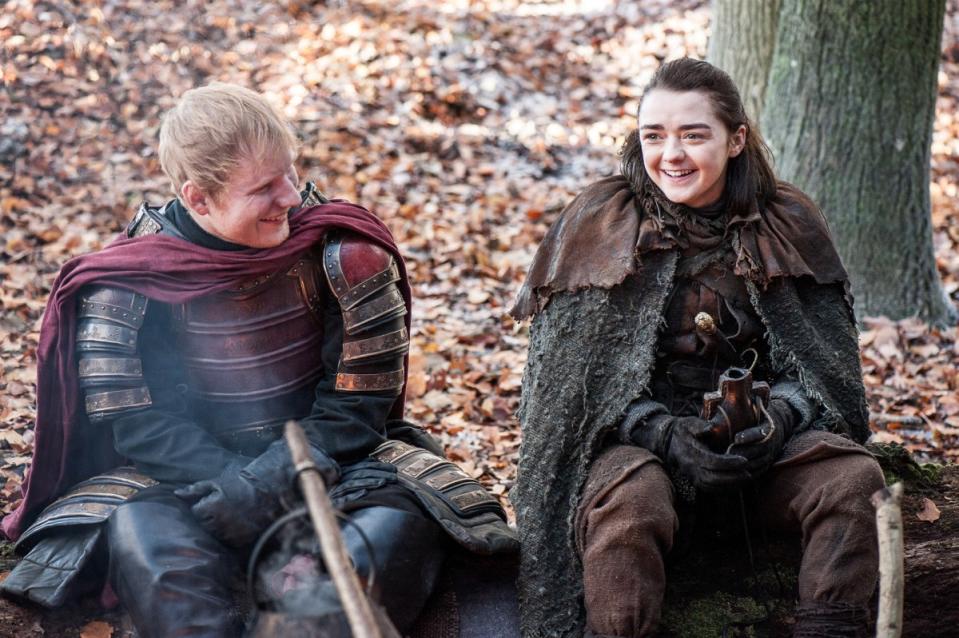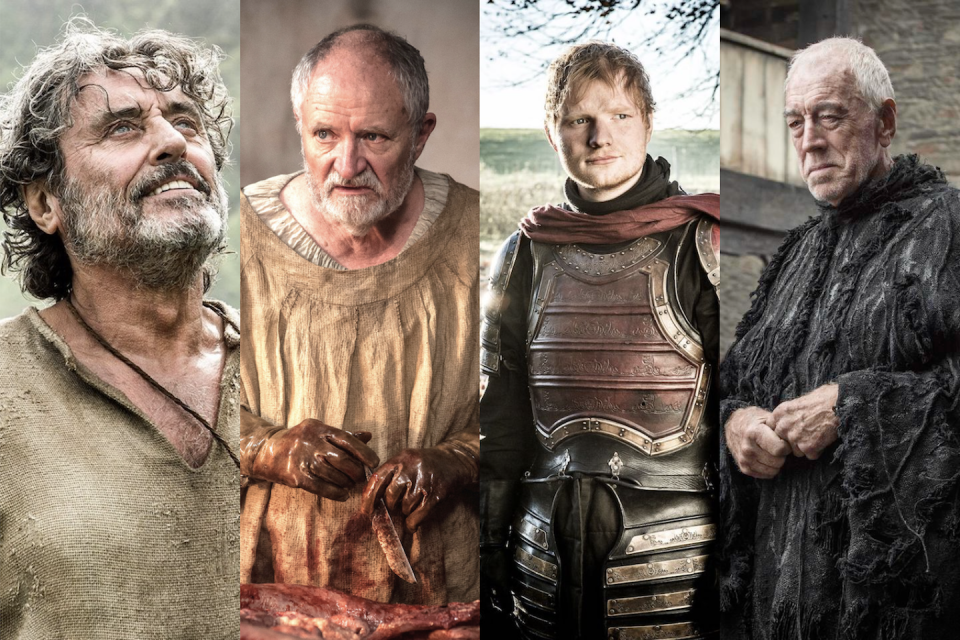Game of Thrones: Are Famous Faces Really Ruining Westeros?
Photos: Courtesy.
When Game of Thrones aired its Season 7 premiere on Sunday, one unexpected event tore through the fandom. No, it wasn’t the mass assassination of House Frey, Bran’s ominous vision of the undead, or even Daenerys’s long-awaited arrival on Westeros that dominated the post-episode conversation. It was a lone ginger Lannister soldier played by British pop sensation Ed Sheeran, whose divisive appearance set off an undeniably harsh backlash—and prompted many to wonder if Game of Thrones had lost sight of the immersive fantasy world it built seven years ago.
Sheeran’s involvement in the show was announced months ago—at SXSW in Austin, when show-runners David Benioff and D.B. Weiss explained that they had tried for years to land Sheeran as a surprise for the show’s young star Maisie Williams, who is a huge fan. Still, even though Sheeran’s cameo was expected, fans were caught off guard when his appearance was significantly splashier than the low-key musical cameos the show has deployed in the past. Sheeran stuck out like a sore thumb in a lovely scene populated by longtime Westerosi inhabitant Arya Stark and a group of unknown actors, and the most common complaint I’ve heard is that his appearance shattered the escapist illusion of Westeros as its own world. Twitter, in short, was having none of it.
Social-media analytics firm Fizziology assessed the damage in a report to Vanity Fair, saying that “compared to last year, more of the sentiment surrounding this year’s premiere was negative.” The backlash was intense but not, according to Sheeran, enough to drive him off Twitter. On Wednesday, the singer posted a cheery, defiant repudiation of the rumor that he had quit the social platform in reaction to the Thrones outcry.
The episode’s director, Jeremy Podeswa, also defended Sheeran in an interview with The Daily Beast by saying that Sheeran’s fame isn’t all that anomalous in a cast of TV actors who have become international stars in their own right: “The truth is, everybody on the show is famous now. [Laughs] So it’s like, it doesn’t mean anything to me. It’s about, are they appropriate for the role?” Casting director Nina Gold expressed a similar sentiment when asked about the increased presence of famous faces in Westeros over the past few seasons. She told Vanity Fair:
We’ve got to the place where it doesn’t unbalance it—the other actors have become stars in their own right—and we haven’t overdone it. It’s quite a subtle smattering. We’re not casting them because they’re names or they’re not names, we’ve just been casting them because they seem like they’d be really great in the part. And when you say, “What about Max von Sydow?” and [show-runners] David [Benioff] and Dan [Weiss] really respond to it, once you start thinking about it, it’s just kind of irresistible.
Von Sydow, Sheeran, Jim Broadbent, Ian McShane, and Jonathan Pryce have all been rather recently added to a cast that once boasted almost entirely unknown actors—at least to Americans. (And while they played named characters, Sheeran’s role was just a cameo; we shouldn’t lose sight of that.) Unlike most prestige-cable dramas these days, Game of Thrones originally kicked off without the added boost of a major movie star or otherwise high-profile actor in the lead. The cast’s most famous actor, Lord of the Rings alum Sean Bean, was chosen in part because his star power helped the Season 1 twist of Ned Stark’s death land with even more of a shock.
The show is lucky, in fact, that actress Gillian Anderson reportedly turned them down for an early, major role (Cersei?). Instead, the world of Westeros has thrived in the hands of performers young and old that Nina Gold and the show-runners discovered in acting schools, on the British stage, and in Scandinavian TV. Aside from the core original cast, standout additions in subsequent years—Kristofer Hivju (Tormund), Gwendoline Christie (Brienne), Pedro Pascal (Oberyn Martell), Bella Ramsey (Lyanna Mormont)—were mostly unknowns who carried no baggage of previous performances with them, and were able to blend seamlessly into the world.
But we shouldn’t lump all the famous faces who have invaded Westeros into the Sheeran camp. Jim Broadbent—an Oscar winner and Harry Potter franchise alum—was entirely at home in his low-key premiere scene with John Bradley’s Samwell Tarly at the Citadel. Broadbent’s performance was very much on the same level as Bradley’s—it was quiet, solid, and unassuming. Jonathan Pryce, too, is recognizable to theater lovers, cinephiles, and Pirates of the Caribbean watchers (so, everyone), yet managed to convincingly disappear into his role as the grubby High Sparrow. Dame Diana Rigg, a household name either for her early, iconic turn as Emma Peel or for years of hosting Mystery! on PBS, has, in her fifth decade in the business, made Lady Olenna Tyrell her most iconic role. And though von Sydow’s aloof Swedish presence didn’t exactly mix with the larger world of Westeros, that was actually perfect for his part as a removed observer in his rather short appearance as the ethereal Three-Eyed Raven.
None of these casting decisions, in the end, felt out of place—but even so, Game of Thrones has made the occasional misstep. The decision to add Ian McShane to the cast last season for a one-and-done turn seemed, at first, a solid one. McShane is an actor who is equally at home in period drama and any rough-and-tumble violent world you might want to throw him into. But the actor’s attitude towards the project, while delightfully irreverent in interviews, resulted in a performance that felt very . . . non-performative.
To this day, most Game of Thrones fans refer to that character not by his given name (the groovy-sounding “Brother Ray”) but as “Ian McShane.” (It’s why I was worried about Angela Lansbury allegedly joining the cast when that mercifully false rumor circulated last fall.) Perhaps if he had had more screen time, McShane would have had a chance to flesh out the Ray character and make us forget who was playing him. But in the end that episode (featuring a very good performance, as always, from Rory McCann) still feels like that time Al Swearengen came to Westeros.
And that, I fear, is how Ed Sheeran’s appearance will be remembered. His character doesn’t have a name beyond “Lannister Soldier,” and even HBO’s own marketing has labeled the video of his scene as “Arya and Ed Sheeran.”
Gold is right that a careful selection and “smattering” of familiar faces won’t throw off the balance of Thrones. But I’m not sure I agree with either her or Podeswa’s reasoning that celebrity cameos and casting don’t stick out because the main cast of Thrones is now famous. After all, they’re famous now for these roles. You’ll often see Kit Harington referred to in the real world as Jon Snow; ditto Emilia Clarke as “khaleesi” or “mother of dragons.” The level of fame isn’t the issue; it’s the associations outside the world of the show.
Podeswa also agrees with the general observation that Maisie Williams seemed especially enthusiastic in her scene with Sheeran: “I think she was really happy to have him there, and they do have a lovely rapport.” But while her easy smile (a rare sight on Arya Stark) did somewhat fit the mood of the scene—a group of young people relaxing together—for those in the audience aware of Williams’s Sheeran fandom, there was an illusion-breaking degree of excitement that felt off. An official HBO photo from the episode looks more like a behind-the-scenes snap than a scene from the show.
We won’t begrudge Weiss and Benioff for doing something very nice for a young actress who grew up working for them, but it’s fair to say that, as far as TV goes, this wasn’t Game of Thrones’ finest hour. Or, to be more accurate to Sheeran’s slim screen time, its finest five minutes.
This story originally appeared on Vanity Fair.
More from Vanity Fair:
13 Photos That Prove William and Kate Are a Perfect Couple
The Game of Thrones Cast Then and Now
The 20 Most Satisfying TV Kisses of All Time
Film's Sexiest Little Black Dresses


